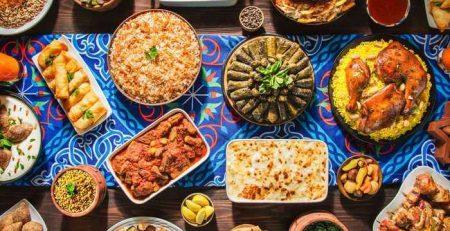Healthy Nutrition Suggestions during Ramadan
Nutritional recommendations to consider during iftar:
-Iftar should be broken with a small start. Olives, dates, dried fruits, walnuts, almonds or a small piece of walnut sausage can be preferred. You should not neglect plenty of water.
-A warm soup is indispensable for iftar tables. It is very important that the soup meets the fluid needs of the body, the nutrients it contains and its satiating properties. Soup is also good for digestion. It can be consumed slowly, half or 1 bowl.
-After 15-20 minutes, you should move on to the main meal. Main course; Vegetable dish with meat, legumes or prepared using a cooking method other than frying; Meat, chicken or fish dishes can be made.
-Rice or pasta can be consumed 2 times a week, maximum 3 times. It is healthiest to choose this as whole wheat rice, pasta and bulgur pilaf.
-1 or 2 slices of bread should be taken with the meal. It should not be forgotten that; The best source of carbohydrates is grain bread and it keeps you full for longer.
-A salad with 1 teaspoon of olive oil should be made every evening alongside the meals. There is no time to eat the salad, it should be consumed from the first moments of the meal. Raw vegetables contain plenty of fiber and provide satiety.
-Fatty foods, pastries, fried foods, roasted foods, and delicatessen products such as salami, sausage, soudjouk and pastrami should be avoided.
-Since evening iftar meals contain nearly 65% of the daily calories required, people who prefer fatty and heavy meals during Ramadan may experience undesirable increases in their blood cholesterol levels.
-These increases in LDL cholesterol (malignant) can increase total cholesterol, while reductions in daily exercise can lower HDL (benign cholesterol) levels. Again, increases in triglycerides show themselves after Ramadan.
Nutritional recommendations to consider during iftar:
Just as breakfast is a golden meal in a healthy diet, sahur is the first meal of the day during Ramadan and is of great importance. Among the habits that are common in society, eating before going to bed at night or waking up at night and drinking only water and going to bed are harmful. Because this type of nutrition increases hunger from approximately 12 hours to an average of 18-20 hours. In this case, muscle breakdown occurs and metabolism slows down. As for the symptoms; There is slowness in daily movements, desire to sleep, headache, and weakness. People who fast in this way get tired quickly and have an exhausted day. Therefore, it is best not to skip sahur meals, which are of high importance.
Don’t forget to drink plenty of fluids!
One of the basic needs of the body is fluid intake. People who fast cannot meet their daily fluid needs because they cannot be consumed during the day. Dehydrated body; It causes fatigue, muscle cramps, dry skin, difficulty in the digestive system, dizziness and a feeling of warmth. For this reason, it is necessary not to neglect fluid consumption before going to bed at sahur, when you wake up, before iftar and after iftar until you go to bed.
Eat fresh apricots against constipation
Insufficient fluid intake increases the risk of constipation during this period. Individuals who experience painful abdominal pain and bloating have a more tense day. For this reason, it is necessary to drink at least 12-14 glasses of liquid from iftar time to the end of sahur. It is beneficial to consume 3-4 fresh apricots for sahur.













